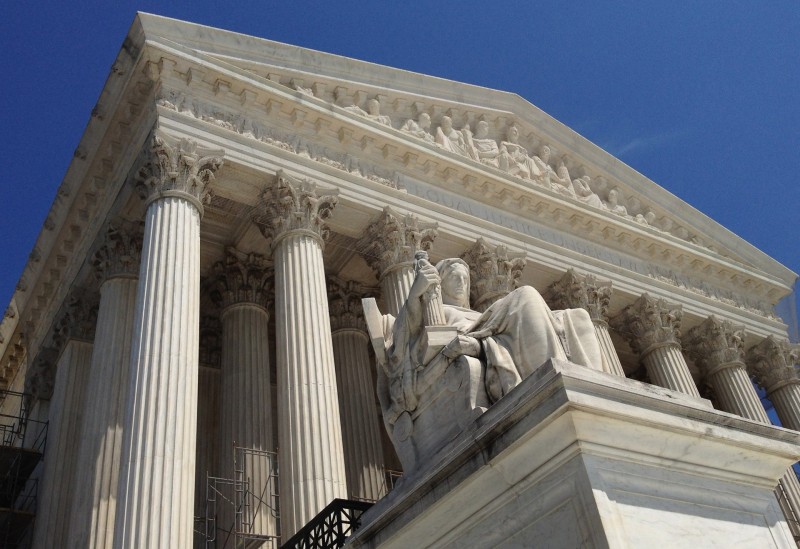"Congress passed the Affordable Care Act to improve health insurance markets, not to destroy them," Roberts wrote in the majority opinion.
In a dissent he summarized from the bench, Justice Antonin Scalia said, "We should start calling this law SCOTUScare." Using the acronym for the Supreme Court, Scalia said his colleagues have twice stepped in to save the law from what Scalia considered worthy challenges.
Justices Samuel Alito and Clarence Thomas joined the dissent, as they did in 2012.
The latest attempt to dismantle the Affordable Care Act at the Supreme Court hinged on just seven words, or maybe even two. A section of the law stipulates that premium assistance, in the form of tax credits that the federal government provides for low- and middle-income people to buy insurance, would be available to those who sign up "through an exchange established by the State."
But 27 states, in protest of the highly contentious law popularly known as Obamacare, resisted establishing their own exchange, the online marketplace where you can shop for and purchase insurance plans. People in those states have to buy insurance through the federal website, HealthCare.gov (which, you'll probably recall, had a notoriously disastrous rollout in 2013 but performed better as time went on). In addition, 11 states rely on mixed federal-state exchanges.
In 2012, the IRS issued regulations making the subsidies available to those who get their insurance through the federal exchange as well as the states'. According to the plaintiffs in the SCOTUS case, that shouldn't have happened; they argued the law's language makes plain that Congress intended to limit the subsidies to those in state exchanges. The administration, congressional Democrats and 22 states retorted that it would make no sense to construct the law the way its opponents suggested.
The idea behind the law's structure was to decrease the number of uninsured. The law, for example, prevents insurers from denying coverage because of "pre-existing" health condition, it requires almost everyone to be insured, and it provides financial help to consumers who otherwise would spend too much of their paycheck on premiums.
The point of the last piece, the subsidies, is to keep enough people in the pool of insured to avoid triggering a so-called death spiral of declining enrollment, a growing proportion of less healthy people and premium increases by insurers.
Several portions of the law indicate that consumers can claim tax credits, no matter where they live. No member of Congress said that subsidies would be limited, and several states said in a separate brief to the court that they had no inkling they had to set up their own exchange for their residents to get tax credits.
As far as California goes, those who receive subsidies for their Obamacare insurance needn't have worried. As KQED's April Dembosky reported earlier this week:
California operates its own independent state exchange, so Californians who receive subsidies to buy their coverage will keep their subsidies, no matter what the court rules, according to several analysts.
“Chaos could erupt in insurance markets in other states, but California would be an island,” said Larry Levitt, health policy expert with the Kaiser Family Foundation. “The direct effects for California are zero.”
The roiling that insurance markets in other states would have experienced would not have affected California either:
“Each state has its own risk pool, so the fact that other risk pools in other states are going into death spirals, will not have any direct impact on California,” said Joel Ario, managing director at Manatt Health Solutions, a consulting firm, and former insurance commissioner in Pennsylvania and Oregon.
As for the rest of the country not in the 12 states plus Washington, D.C., that run their own exchanges, fallout would have been substantial should the subsidies have been canceled. According to the Department of Health and Human Services, more than 6 million people would have lost premium assistance in the states without their own exchange. A Kaiser Family Foundation analysis found those enrollees who receive subsidies would have faced an average effective premium increase of 287 percent.
Even those who don't get subsidies could have seen stratospheric increases in their premiums because of the disruption in the insurance marketplace, triggering the death spiral mentioned above. Without subsidies, many healthy people would likely forgo coverage, and if they pulled out, that would have left the risk pools disproportionately made up of sicker individuals. That would increase the cost to insurers, who would raise the price of premiums, leading to even more people pulling out, and so on.
Jon Brooks, Associated Press and NPR contributed to this report.
